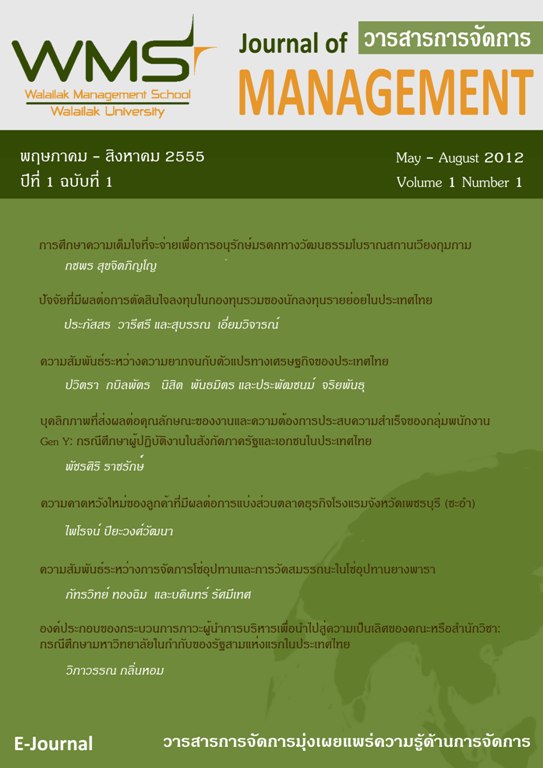Impact of Customer New Expectations on Hotels’ Market Segmentation Hotel Business in the Province of Petchaburi (Cha-am)
Main Article Content
Abstract
The primary objectives of the study were to investigate the relationships between customization-based customers’ expectations and their perceptions of delivered services and also to identify customization-based market segments. Stratified and systematic random sampling methods were used to select 264 guests of hotels of varying grades (1-5 star rating system), resulting in 198 responses. A questionnaire was utilized as a data-collection instrument. The data were analyzed with one-way analysis of variance (ANOVA), paired sample T-test, and cluster analysis. The findings showed that the expectations of customization-based customers were higher than the overall mean of all customers’ expectations. Cluster analysis identified three distinct segments of hotel customers: (1) younger businessmen-young energetic executives who are interested in service-oriented luxury hotels, (2) modern ladies who choose hotels based on low cost (thrift)), and (3) young singles-trendy young people who emphasize luxury hotels that offer attractive ambience.
Based on statistical analysis, the results show that customers’ customization expectations do not vary with gender, occupation, marital status, and trip. However, such expectations vary with education level, age, monthly income, purpose of the trip, information search, and hotels’ ratings. In addition, there is no difference in customers' expectation and their perceptions of services received. Overall, the findings support the SPRA model, which emphasizes service process, customer recognitions, and hotel ambience. These components should lead to satisfaction and loyalty, consistent with customers’ expectations.Article Details
References
การท่องเที่ยวแห่งประเทศไทย. 2550. สรุปสถานการณ์โรงแรม ประจำปี 2549. กรุงเทพมหานคร : ผู้แต่ง.
สำนักงานคณะกรรมการพัฒนาการเศรษฐกิจและสังคมแห่งชาติ. 2551. ผลิตภัณฑ์ภาคและจังหวัด พ.ศ. 2551. กรุงเทพมหานคร: ผู้แต่ง.
สำนักงานคณะกรรมการพัฒนาการเศรษฐกิจและสังคมแห่งชาติ. 2552. ผลิตภัณฑ์ภาคและจังหวัด พ.ศ. 2552. กรุงเทพมหานคร: ผู้แต่ง.
Aday, L. A., & Andersen, R.,. 1978. Access to medical Care. Ann Arbon: Health Administration Press.
Akbar, M. M., & Parvez, M.,. 2009. Impact of Service Quality, Trust and Customer Satisfaction on Customer Loyalty. ABAC Journal, 29(1(January-April): 24-38.
Branson, C. 2003. Patient Satisfaction With Skill Mix in Primary Care: A Review of the Literature. Primary Health Care Research and Development, 4(-): 329-339.
Davis, T. R. V. 2004. Different service firms, different international strategies. Business Horizons, 47(6): 51-59.
Drummond, G., & Ensor, J,. 2005. Introduction to Marketing Concepts. Great Britain: Elsevier Butterwoth-Heinemann
Frutos, J. D., & Borenstein, D. 2004. A framework to support customer-company interaction in mass customization environments. Computers in Industry, 54(-): 115-135.
Gilbert, D., & Wong, R.K.C.,. 2009. Passenger expectations and airline service: a Hong Kong based study. Tourism Management, 24(5): 519-532.
Higgins, P. A., & Straub, A. 2006. Understanding the error of our ways: Mapping the concepts of validity and reliability. Nursing Outlook, 54(1), 23-29.
Hughes, A. M. 2006. Strategic database marketing: The masterplan for starting and managing a profitable, customer-based marketing program. New York: McGraw-Hill.
Jiang, P. 2000. Segment-based mass customization: an exploration of a new conceptual marketing framework. Internet Research, 10(3): 215-222.
Jin, L., He, Y, & Song, H,. 2011. Service customization: To upgrade or to downgrade? An investigation of how option framing affects tourists' choice of package-tour service. Tourism Management, -(-): 1-10.
Kay, J. 2001. What became of the new economy ? National Institute Economic Review (177): 56-69.
Kotler, P., Armstrong, G,. 2010. Principles of Marketing (13th ed.). New Jersey: Prentice Hall.
Kotler, P., & Keller, K. J. 2006. Marketing Management (12th ed.). New Jersey: Pearson Education.
Perpers, D., & Rogers, M. 1999. Do you really know your customers? Sales and Marketing Management, 151(1): 26.
Parasuraman, A., Zeithaml, A.A., & Berry, L.L. 1985. A Conceptual Model of Service Quality ahnd Its Implications for Future Research. Journal of Marketing, 49(4): 41-50.
Pine II, J. 1993. Mass Customizing Products and Services. Planning Review, 21(4): 6-13,55.
Zeithaml, V. A., Parasuraman, A., & Berry, L. L. 1990. Delivering quality Service: Balancing customer perceptions and expectations. New York: Free Press.
Zeithaml, V. A., Bitner, L. L., & Gremler, D. 2006. Services Marketing: Integrating Customer Focus Across the Firm. (4th ed). New York, McGraw-Hill.


